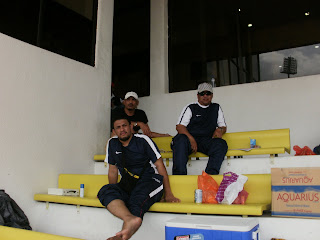berlari, aku dan sebagainya
21 September 2010
02 August 2010
Pacemaker
Kaki injured traning pun kantoi tapi dok gila juga nak masuk race...so wa ambik keputusan jadi pacemaker. Memang seronok jadi pacemaker sebenarnya, wa buat dengan ikhlas dengan niat ingin membantu dan acapkali juga orang akan berterima kasih dan wa puas melakukannya.
Dari pengalaman wa kadangkala menjadi pacemaker adalah sukar terutama apabila pace orang yang kita pace tu di bawah tahap minimum, silap-silap boleh membawa kecederaan kepada diri sendiri. Lebih parah lagi orang yang kita cuba pace itu menuduh kita cuba menggangu pacenya dan tercetusnya sesuatu yang tidak diingini ..hee heee.
Curent wa boleh Pace :-
10k @ 50min to 1hr
20k @ 1hr 45 to 2hr
5k @ 20min to 25min
1k @ 4min
400m@ 65sec
26 July 2010
23 July 2010
Kapal terbang Anisah
why kenyan?
This is how the Kenyans see why they are winning in most of the Marathon and other long distance Races worldwide. This is the very same attitude I want to impart to the elite runners who are under the Team Bald Runner with the hope of improving their performance in long distance running.
I am presently reading the book, “More Fire: How To Run The Kenyan Way” by Toby Tanser which is a continuation of his first book, “Train Hard, Win Easy”, his first book on Kenyan running. In the concluding portion of the book, the author listed 15 ways to adopt a Kenyan Training Method. And here is the list as copied from the book.
1. Injury Prevention—They say the best way to avoid a spear is to stand out of range; this applies to running. Kenyans are excellent at resting up if a possible injury pain is noticed. Do not let that pain get too near you.
2. Simplicity—Kenyan running is very organic, which in itself is the very essence of the sport. Simple methods are executed with imposing intensity. They are focused and concentrated in their running and they could not afford any distractions. It simply means that they have no time for cellphones, Internet browsing, listening to Ipods, or watching the TV or even going to Malls or social parties. They just simply run and train!
3. Group Training—The power of the group never ceases to be underplayed in improving performance.
4. Diet—Try to eat three meals a day. Kenyans rarely eat between meals and seldom have desserts.
5. Don’t look for perfection—Kenyan athletes do not get down or disappointed after a bad performance or session. Being out there and trying, means you are a winner and trains hard again and that is the Kenyan Way.
6. Don’t add up your weekly mileage—Most Kenyans only know their mileage as a need to satisfy Western journalists. The ethic of the focus is to concentrate on the given day.
7. Choose one coach, or training plan, and stick to it. If you chase one chicken, you stand a better chance of catching it than running after two. Kenyans are very good at getting one 12-week program.
8. Block training—The Kenyans use block work with non-active rest periods. Some call this “periodization”. The Kenyans train for a specific race or series of races. After a series of races, the Kenyans then stops running completely. It can be from 2-3 weeks, to one month or more, but the difference is that during this time the athlete does virtually no training; not even cross-training to keep in shape.
9. Don’t push the body when tired—There is always another day.
10. Run off-road—Running on hard surfaces kills the speed and the natural spring of the legs. 90% of their running workouts are done on off-road at an altitude of 2,000 meters.
11. Be optimistic—If you never kick the ball, you will not score a goal. Kenyans are extremely positive individuals.
12. The secret of Kenyan mechanics appears to be in the foot—Kenyans have very strong ankles, with spring-like qualities that allow the body to bound along with an almost jump-like momentum.
13. Kenyans tend to lean toward a lightweight, flexible shoe—If you break your arm, after a month in a cast the arm is weak; hence if the foot is put inside a rigid shoe that does not allow each and every muscle in the foot to work, these muscles become weak.
14. Run to improve running—There is no need to go to the gym or do some cross-training, Kenyans do their running workouts 2-3 times a day.
15. “Nothing comes easy” is another slogan of Kenyan running, but what is achieved by pushing your own limits is life’s richest reward. To collapse out on the roads with blood in your shoes knowing you gave it your best shot is reward beyond words…
I am not telling everybody to follow this list but knowing how these world-class elite athletes train, this list would answer the “why & how” the Kenyans are consistent Champions in long distance running events worldwide
19 July 2010
25 February 2010
Hat yai
Subscribe to:
Posts (Atom)











